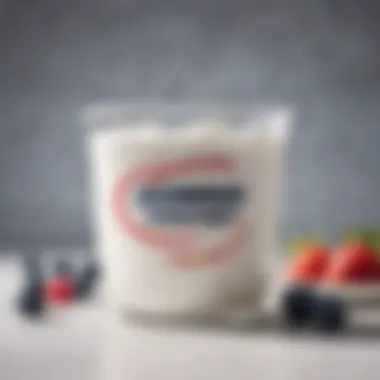The Probiotic Content of Fage Yogurt Explored


Intro
In recent years, probiotics have garnered significant attention for their role in promoting gut health. Among the multitude of products available in the yogurt market, Fage yogurt has emerged as a notable contender, particularly in its commitment to providing a rich probiotic profile. This article aims to explore the probiotic content of Fage yogurt, delving into its manufacturing techniques, nutritional benefits, and the science underpinning the efficacy of probiotics. In addition, it addresses the common misconceptions surrounding yogurt and its health benefits to give consumers a comprehensive understanding of this cherished food item.
Probiotic Content in Fage Yogurt
Fage yogurt is characterized by its unique probiotic strains, which are crucial for maintaining gut health. Probiotics are live microorganisms that, when consumed in adequate amounts, confer a health benefit to the host. The main probiotics found in Fage yogurt are Lactobacillus bulgaricus and Streptococcus thermophilus. These strains not only aid digestion but also contribute to nutrient absorption.
Manufacturing Process
The manufacturing process of Fage yogurt is integral to its probiotic content. It begins with high-quality milk, which undergoes pasteurization to eliminate harmful bacteria. Following pasteurization, cultures of Lactobacillus bulgaricus and Streptococcus thermophilus are added to the milk. This mixture is then allowed to ferment at a controlled temperature for several hours. This fermentation process is vital, as it promotes the growth of probiotics, leading to the tangy flavor and creamy texture characteristic of Fage yogurt.
Nutritional Benefits
The nutritional profile of Fage yogurt complements its probiotic richness. - High Protein Content: Fage yogurt is particularly rich in protein, which is essential for muscle repair and growth. - Low in Sugar: Unlike many flavored yogurts, Fage yogurt has minimal added sugars, making it a healthier choice. - Rich in Calcium: This yogurt is a good source of calcium, which promotes bone health.
Gut Health Impact
The impact of probiotics on gut health cannot be overstated. Probiotics help maintain the balance of gut flora, reduce symptoms of lactose intolerance, and enhance the immune system. Regular consumption of Fage yogurt may assist in reducing gastrointestinal disorders such as irritable bowel syndrome and diarrhea, thus contributing to overall well-being.
"Incorporating Fage yogurt into one’s daily diet can be a simple yet effective way to boost probiotic intake."
Consumer Misconceptions
Despite the well-documented benefits of yogurt, several misconceptions persist. Some individuals believe that all yogurts have the same probiotics, which is not the case. The strains present in Fage yogurt specifically are crucial for its unique benefits. Furthermore, there's a myth that yogurt consumption is only beneficial for adults. However, children and seniors can also greatly benefit from probiotics found in yogurts.
Epilogue
Fage yogurt stands as a noteworthy example of how a simple dairy product can significantly contribute to gut health. Understanding its probiotic content, the benefits one can derive, and the common misconceptions can empower consumers to make informed dietary choices.
Understanding Probiotics
Probiotics play a vital role in maintaining gut health and overall well-being. This section aims to clarify the concept of probiotics, their varieties, and their associated health advantages. It is crucial for readers to grasp these concepts, as they set the foundation for understanding the specific probiotic content present in Fage yogurt and its implications for health.
Definition of Probiotics
Probiotics are living microorganisms, mostly bacteria, that provide health benefits when consumed in sufficient amounts. They are often referred to as "good" or "friendly" bacteria, which contribute to a balanced gut microbiome. This balance is essential for digestion, nutrient absorption, and protecting against harmful pathogens. In simple terms, probiotics act as allies for our digestive system, promoting a favorable environment for beneficial bacteria.
Types of Probiotics
Probiotics can be categorized into various strains, each with different properties and benefits. Some of the most common types include:
- Lactobacillus: Found in yogurt and fermented foods, this strain aids lactose digestion.
- Bifidobacterium: Commonly present in the intestines, it helps alleviate symptoms of irritable bowel syndrome and constipation.
- Saccharomyces boulardii: A yeast-based probiotic effective against diarrhea and aids in gut health after antibiotic use.
- Streptococcus thermophilus: Primarily used in yogurt production, it is beneficial for lactose intolerance.
By recognizing these types, consumers can make informed decisions when choosing probiotic-rich foods like Fage yogurt.
Health Benefits of Probiotics
The consumption of probiotics has been linked to numerous health benefits, many of which are significant for digestive and overall health. Key benefits include:
- Improved Digestion: Probiotics enhance the digestion of food, reducing issues like bloating and gas.
- Boosted Immune Function: A healthy gut flora can strengthen the immune system, increasing the body's ability to fend off infections.
- Enhanced Nutrient Absorption: Probiotics facilitate the breakdown of nutrients, allowing for better absorption of vitamins and minerals.
- Reduction of Antibiotic-Associated Diarrhea: Probiotics can help restore the gut's balance after antibiotic treatment, decreasing the likelihood of diarrhea.


In summary, understanding probiotics helps illuminate their importance in dietary choices, particularly regarding yogurt and Fage products. Their numerous health benefits provide not just digestive support, but also contribute to overall health. It is essential for consumers to consider these factors when selecting dairy products and to appreciate the role probiotics play in fostering a healthy lifestyle.
Overview of Fage Yogurt
The topic of Fage yogurt is crucial in understanding the broader context of probiotics and their significance in nutrition. As a prominent player in the yogurt market, Fage has carved a niche by emphasizing not only taste but also health benefits. This brand provides a noteworthy example of how traditional yogurt-making processes can lead to a product rich in probiotics. Recognizing the importance of Fage highlights its role in the daily diets of health-conscious consumers.
History of Fage
Fage was established in 1926 in Athens, Greece. Its founder, Athanasios Filippou, aimed to produce a product that represented the essence of Greek yogurt. Initially, Fage remained a local brand but began to expand in the 1990s. The company's commitment to quality and authenticity attracted a global audience. Today, Fage is recognized for its thick, creamy texture and rich flavor, indicative of traditional Greek yogurt. The brand has effectively maintained its heritage while adapting to modern consumer preferences, making it a staple in many households.
Production Process of Fage
The production of Fage yogurt follows a meticulous process that enhances its probiotic content. The key steps include:
- Milk Selection: Fage sources high-quality milk, primarily from local farms, ensuring a fresh foundation for their yogurt.
- Pasteurization: The milk is pasteurized to kill any harmful pathogens. This step is vital for safety and quality.
- Inoculation: Specific probiotic strains, primarily Lactobacillus bulgaricus and Streptococcus thermophilus, are added. These cultures ferment the milk, creating yogurt.
- Fermentation: The mixture undergoes fermentation, where the live cultures work to develop flavor and texture.
- Straining: Fage uses a unique straining technique that removes excess whey. This process results in their signature thick yogurt and concentrates the probiotic content.
This production method not only preserves the nutritional value but also maximizes the health benefits attributed to probiotics found in Fage yogurt.
Nutritional Profile of Fage Yogurt
Fage yogurt offers a balanced nutritional profile that appeals to a wide range of dietary needs. Here are some key aspects of its nutritional content:
- Protein: Fage yogurt is a high-protein food. A typical serving provides an ample amount, which aids in satiety.
- Fat Content: Available in various fat levels, including whole milk, 2%, and non-fat versions, Fage caters to different preferences and dietary requirements.
- Calcium: This yogurt is a good source of calcium, essential for bone health.
- Probiotics: The presence of live cultures promotes gut health, making Fage an excellent choice for those seeking the benefits of probiotics.
- Vitamins: It contains B vitamins, which play a role in energy metabolism.
The combination of these nutrients places Fage yogurt among the top choices for health-conscious consumers seeking functional foods that contribute to overall wellness.
By understanding the elements of Fage yogurt, consumers can make informed dietary choices that align with their health goals.
Does Fage Contain Probiotics?
The probiotic content of Fage yogurt plays a significant role in its appeal to health-conscious consumers. Probiotics are live microorganisms that benefit human health, particularly in gut health. Many people look to yogurt for its probiotic properties, and understanding what Fage yogurt offers in this regard can help guide informed choices.
Probiotic Strains in Fage
Fage yogurt contains specific strains of probiotics. The main probiotic strains found in Fage include Lactobacillus bulgaricus and Streptococcus thermophilus. These two bacteria work synergistically to ferment milk into yogurt, enhancing its texture and taste while providing beneficial properties.
- Lactobacillus bulgaricus: This strain is known for its ability to survive in the acidic environment of the stomach, reaching the intestines effectively. It helps in improving digestion and can boost nutrient absorption.
- Streptococcus thermophilus: The fermentation process is aided by this strain, which contributes to the yogurt's creamy consistency. It also supports the overall gut flora, promoting a balanced bacterial environment.
These probiotics have been linked to various health benefits, such as enhanced digestive health, and potentially improved immune function. Knowing these strains helps consumers gauge the potential effectiveness of Fage as a probiotic source.
Comparison with Other Yogurts
When comparing Fage with other yogurts, it's essential to consider both probiotic strains and their health benefits. Many yogurts on the market claim to contain probiotics, yet not all provide the same variety or quantity of beneficial bacteria.
- Frigidity of Strains: Some brands mix various probiotic cultures in their yogurts. For example, brands like Chobani and Oikos often include additional strains such as Bifidobacterium or other Lactobacillus species. This variation can lead to differences in effectiveness.
- Live Cultures: Fage is noted for its high content of live active cultures. Consumers should look for yogurts that specify their live cultures' presence, as many commercial brands may contain less beneficial bacteria by the time of consumption.
In short, Fage yogurt possesses admirable probiotic characteristics. Its blend of Lactobacillus bulgaricus and Streptococcus thermophilus sets it apart from other options, catering to consumers focused on gut health and nutritional value. Probiotic-rich yogurts like Fage are indeed preferable for fostering positive digestion and overall well-being.
"Probiotics are more than a trend; they are an essential component of a balanced diet, enhancing gut health and nutrient absorption."
Understanding the specifics of Fage's probiotics and how they stack up against other yogurts can empower consumers to make healthier dietary choices. As yogurt continues to be a staple in many diets, knowledge of its probiotic content is indispensable for maximizing its benefits.
The Role of Probiotics in Gut Health


Probiotics are live microorganisms that provide health benefits when consumed in adequate amounts. They are often referred to as "good bacteria" because they help maintain a healthy balance in the gut microbiome. In the context of this article, the role of probiotics in gut health is paramount, particularly when analyzing fermented products such as Fage yogurt. The consumption of Fage yogurt, which is rich in probiotics, may contribute to improved digestive health and bolster various bodily functions.
Impact on Digestive Health
A significant body of research indicates that probiotics can enhance digestive health. They help in the metabolism of food and improve nutrient absorption. Probiotics help to prevent and treat conditions like diarrhea, constipation, and irritable bowel syndrome (IBS). When gut flora is disrupted, it can lead to digestive discomfort. This imbalance can be caused by factors like poor diet, stress, and antibiotic use. By regularly consuming Fage yogurt, individuals may introduce beneficial bacteria to their gut, which aids digestion and reduces gastrointestinal issues.
- Reduces Diarrhea: Specific probiotic strains found in Fage yogurt, such as Lactobacillus bulgaricus and Streptococcus thermophilus, have been shown to help in reducing the occurrence and severity of antibiotic-associated diarrhea.
- Enhances Nutrient Absorption: Probiotics enhance the bioavailability of nutrients. They may assist in the absorption of vitamins and minerals, such as calcium and magnesium, crucial for overall health.
- Supports Regularity: Regular consumption of probiotics can help in maintaining bowel regularity, which is essential for a healthy digestive system.
Probiotics and the Immune System
Probiotics not only benefit the digestive system but also play a role in strengthening the immune system. A large percentage of the immune system is actually located in the gut. The balance of gut bacteria is therefore crucial for immune function.
Research suggests that probiotics can enhance the production of antibodies and immune cells that help to fend off infections. They modulate the immune response, potentially lowering the risk of infections as well as inflammatory disorders.
- Boosts Immune Response: Probiotics may increase the production of specific antibodies, which help prevent illness. The strains present in Fage yogurt can stimulate the immune system directly.
- May Reduce Allergies and Inflammation: Some studies indicate that probiotics can reduce the frequency of allergic reactions and can help in conditions like eczema.
- Fights Infections: A balanced gut microbiome can prevent the proliferation of harmful bacteria, thereby reducing the risk of gastrointestinal infections.
The integration of probiotics into one's diet can lead to a multiplicity of health benefits, particularly in gut health and immune support.
Consumer Insights and Misconceptions
Understanding consumer insights and misconceptions about probiotics is essential in today's health-focused market. Many individuals are aware of the importance of gut health, influenced by growing awareness of probiotics. However, misconceptions can cloud their understanding of what probiotics do and how they benefit health. This section seeks to untangle these misunderstandings and present a clearer picture for consumers. It is vital to recognize that clarity on these topics can lead to better health choices and improved diets.
Common Misunderstandings about Probiotics
Probiotics often face several misunderstandings that can mislead consumers. Here are some prevalent misconceptions:
- All Probiotics are the Same: Many believe that different probiotic strains offer the same benefits. In reality, specific strains have unique effects. For instance, Lactobacillus acidophilus may support digestive health, while Bifidobacterium longum may aid immune function.
- You Need to Take Supplements for Probiotics: Some consumers think that only supplements can provide adequate probiotics. However, fermented foods, like Fage yogurt, offer a natural and delicious source of these beneficial bacteria.
- Probiotics Will Solve All Gut Issues: Many assume that consuming probiotics will automatically resolve gut health issues. While they can support gut health, they should not replace medical advice or treatment. A multifaceted approach to health is essential.
"Education around probiotics is necessary for consumers to make informed decisions about their diets."
- Probiotics Can Expire or Die Off: Some individuals believe that as soon as probiotics leave the shelf, they lose potency. Most probiotics remain effective at room temperature for considerable time. However, storage conditions can affect viability.
Clarifying these misconceptions is necessary for consumers to confidently incorporate probiotics into their diets and better understand their health benefits.
Consumer Preferences in Yogurt Selection
Consumer preferences for yogurt vary widely, influenced by taste, health benefits, and nutritional content. When choosing yogurt, people often consider:
- Taste and Texture: Creaminess and flavor can heavily influence preferences. Fage yogurt, known for its thick Greek texture, appeals to many because of its rich taste and versatility in recipes.
- Nutritional Value: The nutritional profile is significant for health-conscious consumers. Fage's high protein and low sugar content attracts those looking to increase protein intake without excessive sugars.
- Presence of Probiotics: As awareness of gut health grows, consumers are focusing more on probiotic content. Understanding that Fage yogurt contains beneficial strains plays a role in its selection over other products.
- Ingredient Transparency: Modern consumers prefer brands that are honest about their ingredients. Fage’s commitment to quality ingredients without unnecessary fillers resonates with discerning buyers.
In summary, understanding consumer insights and the various misconceptions surrounding probiotics empower individuals to make educated choices regarding their diet, particularly yogurt selection.
Incorporating Fage into Your Diet
Incorporating Fage yogurt into your diet provides a simple yet effective way to enhance your nutritional intake. Fage yogurt is known for its rich probiotic content, which can significantly contribute to gut health and overall wellbeing. This section will detail some important elements to consider when including Fage yogurt in your daily meals.
Many people seek nutritious options that are versatile and easy to integrate into various diets. Fage offers a flavorful base for an array of meals and snacks. Rich in protein and low in sugar, it serves as an excellent choice for breakfast, dessert, or even as a cooking ingredient. Moreover, its creamy texture allows it to blend seamlessly into both savory and sweet recipes.
While considering Fage in your diet, it is beneficial to remember its health benefits. Probiotics in Fage can help maintain a balanced gut microbiome, which contributes to better digestion and potentially strengthens the immune system. Eating Fage regularly may help individuals who experience digestive discomfort. Consuming yogurt, particularly one rich in probiotics like Fage, can have a positive impact on one’s overall digestive health.
Also, moderation is key when incorporating any yogurt into your diet. Paying attention to portion sizes can help you enjoy the health benefits without going overboard on calories.
Healthy Recipes Featuring Fage


Fage yogurt can be used creatively in various recipes. Here are some simple yet effective ways to incorporate it:
- Smoothies: Blend Fage yogurt with fruits like berries or bananas for a healthy breakfast or snack. The extra protein can help you feel fuller longer.
- Dip: Mix Fage yogurt with herbs and spices to create a nutritious dip. This is perfect for vegetables or whole-grain crackers.
- Salad Dressing: Combine Fage with vinegar, lemon juice, or yogurt to create a creamy dressing that adds flavor to salads.
- Desserts: Use it as a base for desserts. Layer Fage yogurt with granola and fresh fruit for a quick and healthy parfait.
Serving Suggestions for Fage Yogurt
There are several serving suggestions that enhance the enjoyment of Fage yogurt while maintaining nutritional value:
- Simple Bowl: Serve Fage yogurt plain, topped with honey and fresh fruits. This brings out its natural flavors.
- Parfait: Create a layered parfait as mentioned earlier. Alternate Fage yogurt with granola and berries for a balanced meal.
- Savory Option: Kömpai Fage yogurt with chopped cucumbers, garlic, and herbs for a unique addition to your meals or snacks.
- Quick Snack: For a quick snack, mix Fage yogurt with a scoop of nut butter and a sprinkle of cinnamon or cocoa powder.
Incorporating Fage yogurt into your meals is a straightforward yet beneficial way to enrich your diet with probiotics and important nutrients.
In summary, including Fage yogurt in your diet can lead to several health advantages, especially regarding gut health. Its versatility in recipes makes it an attractive ingredient for any meal of the day.
Future of Probiotics in Dairy Products
The exploration of probiotics in dairy products holds notable significance in the culinary and health landscape. The demand for functional foods is rising. Consumers increasingly seek options that not only satisfy their taste but also contribute to their well-being. Dairy products, particularly yogurt, provide a natural medium for probiotics. This blend of flavors and benefits marks an evolution in dietary habits.
As we look ahead, it becomes vital to address several specific elements in the discussion of probiotics within dairy products. First, there is a growing interest in understanding which probiotic strains are most effective in promoting health. Research continues to highlight the benefits of strains such as Lactobacillus and Bifidobacterium. These bacteria not only support gut health but are also linked to improving immune function and possibly influencing mental health.
Moreover, we see an increasing focus on personalized nutrition. Consumers desire products tailored to their individual health needs. This trend emphasizes the importance of customization in yogurt production, where the selection of probiotic strains can be adjusted based on consumer health profiles.
Key considerations also involve the sustainability of dairy farming practices. There is a shift towards embracing probiotic-rich dairy products that are produced using environmentally friendly practices. This aspect reflects consumer values and supports future market growth.
"As awareness of gut health grows, the role of probiotics in dairy has never been more crucial to both consumers and producers."
In summary, the future of probiotics in dairy products promises a blend of innovation and health consciousness. As research advances and market demands evolve, dairy companies must adapt and innovate to remain relevant in this competitive sector.
Emerging Trends in Probiotic Science
Emerging research in probiotic science opens up new avenues in understanding human health. Notable trends include the identification of novel strains and their health impacts. Scientists are exploring unconventional bacteria that show potential longevity benefits. Additionally, advances in genomics have allowed a more in-depth understanding of how probiotics function at a cellular level.
Another trend involves exploring the synergies between probiotics and prebiotics. This combination can enhance the efficacy of probiotic products, offering consumers even greater health benefits. There is also a growing emphasis on research that connects gut health with conditions such as obesity and autism, leading to potential breakthroughs in treatment.
Potential Innovations in Yogurt Production
One significant innovation in yogurt production relates to fermentation technology. New methods are being developed that enhance the survival rates of probiotics during production and storage. This ensures that consumers receive the full probiotic benefits of the yogurt they purchase.
Moreover, manufacturers are using plant-based ingredients alongside traditional dairy. This combination caters to the surge in plant-based diets while maintaining probiotic efficacy. With advancements in microbial management, the ability to produce yogurt with specific probiotic profiles becomes more achievable.
Additionally, packaging technology that promotes the stability of probiotics is becoming crucial. Incorporating targeted delivery systems could ensure that probiotics remain viable until they reach the gut, enhancing their health benefit potential.
The End
The understanding of probiotics, particularly in the context of Fage yogurt, underscores the importance of selecting quality dairy products for health benefits. This article has examined how Fage yogurt not only contains a variety of probiotics but also supports digestive health and immune function.
Key Elements:
- Probiotic Diversity: Fage yogurt includes specific probiotic strains that are beneficial for gut flora, promoting better digestion.
- Health Benefits: Regular consumption can lead to improvements in digestion and overall gut health, showcasing an essential role of probiotics in the diet.
- Consumer Education: Many misconceptions exist regarding probiotics and yogurt in general. Educating consumers can lead to informed choices that enhance dietary habits.
Furthermore, the article highlighted how emerging trends in probiotic science may influence future dairy product formulations. As innovations continue to evolve, there may be future opportunities for probiotics in even wider applications within the food industry.
"A deep understanding of the probiotic content in products like Fage yogurt paves the way for better health choices."
Considerations About Fage Yogurt:
- It stands out in a crowded market by providing specific strains that benefit gut health.
- Awareness of its nutritious profile encourages inclusion in various types of diets, appealing to health-conscious consumers.
In summary, Fage yogurt embodies the marriage of excellent taste and health benefits, making it a recommended option for those looking to enhance their dietary intake of probiotics. By addressing misconceptions and shedding light on the significant health advantages of probiotics, we can encourage a more educated consumption of dairy products.







